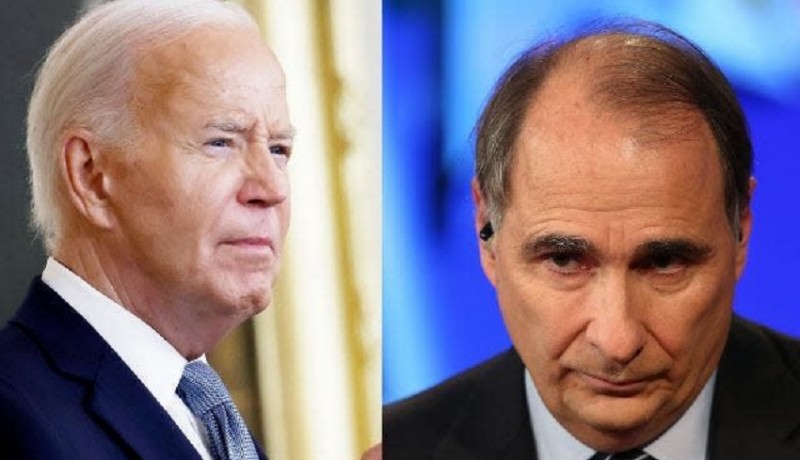
US President Joe Biden's refusal to yield to pressure to withdraw from his reelection bid appears to be a deliberate tactic aimed at using up the remaining time, making it difficult for his party to find an alternative candidate and forcing his opponents to back down.
Each day Biden holds his ground, the logistics and feasibility of replacing him become increasingly challenging and risky. The prospect of weeks of internal Democratic discord, while a unified Republican Party nominates former President Donald Trump, may seem less appealing than rallying behind Biden, despite concerns about the 81-year-old president's health and ability to defeat Trump.
"It's chaotic," said James Carville, a consultant who has been among several Democrats urging Biden to step aside and clear the path for a new nominee. "If he gets his way, everyone will just get worn out and say, 'It's too much trouble.'"
Biden's stance seems to be gaining some initial traction. On Tuesday, certain Democratic leaders in Congress voiced support for the president and suggested it was time to move forward. "Right now, the urgent priority is for Democrats to stay united and focus on countering the threat posed by Trump and his extreme agenda," stated Rep. Diana DeGette of Colorado. "If we do that, we'll succeed."
Time is on Biden's side. Attention in the coming days will shift to Trump, who is expected to announce his running mate before his party convenes next week in Milwaukee to officially nominate him for a second term. Biden will largely stay out of the public eye, concentrating on behind-the-scenes efforts to keep nervous Democrats in line.
Between July 18, when Trump is slated to accept his party's nomination in Milwaukee, and August 22, when Biden is scheduled to accept his party's nomination in Chicago, there are 35 days. However, the Biden campaign, in coordination with the Democratic National Committee, appears poised to shorten this timeline even further.
The party plans to conduct a virtual roll-call vote weeks before the convention begins on August 19, a move intended to leave no doubts about who will lead the Democratic ticket this November.
While these plans are not set in stone — the party establishes and can alter the rules — Biden, despite his current determination to stay in the race, could change his mind, especially if discouraging polls or another lackluster debate performance shakes the party's confidence and leads to more Democratic defections.
Biden's defiance, casting himself as a champion against the establishment, even as polls suggest most voters view him as too old to run, could be a strategy for self-preservation or a savvy political maneuver by the president and his team. Either way, it limits the party's alternatives and flexibility if he were to step down. (While technically possible, it is politically improbable for the Democratic National Committee to vote to replace him if he does not voluntarily withdraw from seeking reelection.)
There is no precedent for how a party should proceed to replace a presumptive nominee after the primaries: how to vet and test potential replacements without the benefit of candidates enduring the scrutiny of voters and the training that comes with a primary. The proposals being discussed require the kind of consensus within the party that becomes increasingly difficult with the compressed timeline now emerging.
For instance, several Democrats have proposed a series of candidate forums across the country. This raises complex questions that would need quick resolution: Who moderates — a former president like Barack Obama or Bill Clinton, both frequently mentioned, or a journalist? Who forms the audience? And how does the party select which candidates are eligible to participate?
There are alternatives, though they may be equally challenging. Instead of formal forums, candidates could spend the time before the convention traveling the country, meeting state delegations, and seeking support. But this approach, too, is time-consuming, expensive, and complex, favoring candidates with financial resources and established networks. Even prominent party figures may decide the risks outweigh the benefits, opting to wait until 2028.
A last-minute change at the top could benefit one Democrat mentioned as a potential successor: Vice President Kamala Harris. With her name recognition, funding, and institutional support, she could step in more seamlessly than other contenders.
"Everyone understands that President Biden will be the nominee," remarked Rep. Ro Khanna, D-Calif. "But in case of unforeseen circumstances preventing Biden from running, Kamala Harris would step in."
Yet, amid a landscape of unfavorable options, some argue that appointing Harris is far from ideal. It would bypass the competitive process that could allow the party to vet nominees and potentially reduce intra-party discord and accusations of backroom deals.
The decision to hold a virtual roll call is a clear indication of the party's effort to reinforce the perception of Biden's inevitable nomination.
Initially, Democrats planned an early vote due to an Ohio law requiring candidates to be finalized by August 7, or risk losing their spot on the state's ballot.
Among Democrats, speculation abounds whether this strategy is a calculated move by Biden and his seasoned aides, who possess a deep understanding of convention rules and their intricacies.
These tactics have sparked some public criticism. "Biden is playing for time," remarked Mehdi Hasan, a former MSNBC host, on the social media platform X. "It's selfish, reckless, but above all, transparent."
And yet, it might be effective. "Within the Democratic Party, there's a growing consensus that Biden will be the nominee, and we need to focus on making the case against Donald Trump in 2025," Khanna added.
Even Carville, one of the first to call for Biden not to seek reelection, seems resigned to this outcome. "Can you imagine how chaotic Chicago will be?" he commented, referring to the upcoming convention. "We're in for a tumultuous four days."